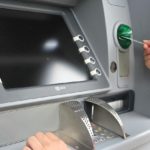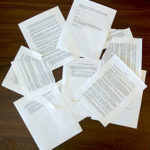When properly prepared the entire process from recording ID to signing and stamping the document should take less than 5 minutes. Unfortunately most appointments take over an hour because clients are unprepared. We understand that it can be a stressful situation, but if you will PLEASE read the information below and follow our advice and instructions we can get your documents signed, notarized and let your patient / loved one get back to rest quickly!
Before the notary arrives:
- Please have paperwork completely filled out EXCEPT for the FINAL SIGNATURES. If the notary has to wait for paperwork to be completed (except signatures), a waiting fee may be charged. The notary does NOT need to watch patients fill out the paperwork. Have everything filled out and ready to sign.
The process *should* take less than 5 minutes, but often ends up taking over an hour when clients are unprepared. - Please prepare a space for the notary to work- a FLAT, *CLEAN*, *DRY*, hard surface at least 2×2 feet would be appreciated to allow the notary to work and stamp your documents. Bedside rolling tables are typically not sturdy enough to imprint the notary stamp. Counter tops, desks or night stands would be appreciated.
- Hospital and nursing home staff (nurses, etc) CAN NOT ACT AS WITNESSES. They will NOT allow their staff to serve as witnesses. Please do not rely on hospital or nursing home staff to witness your documents. If the notary must wait for witnesses to be found a waiting fee may be charged. Please have witnesses present and ready to sign (if witnesses are required). We do not provide witnesses as this could be considered a conflict of interest if any of my staff witnessed documents I notarize. Every document is different and we do not know if your document will need a witness. To find out if you need witnesses, READ your document. If it has signature lines for witnesses, there’s a better than 90% chance you will need witnesses 🙂
- Notify doctors and nurses at least an hour in advance that the patient will be signing legal documents and they should not administer any drugs that could affect the patient’s cognitive function or ability to understand the documents they will be signing.
- Make sure the patient can sign their name without any help. Often patients are too weak, can’t see well, or can’t keep their hand in the right place to complete their signature. Ask the patient to practice signing their name on a scrap sheet of paper on a straight line. The signer’s signature doesn’t have to be perfect (or even pretty) but should be reasonably identifiable as a signature and placed reasonably close to the signature line. This may seem trivial, but this is actually an issue that is difficult for many elderly or ill patients to do and often results in the inability to complete the signing.
- Please make sure the patient is awake and alert when the notary arrives. The patient must be aware of what they are signing. We would also appreciate if the patient/signer could take care of any restroom or personal care needs well before the notary arrives for the appointment.
Signer / Patient Requirements:
1. The patient must be awake, coherent, an not under the influence of drugs (prescription or otherwise) that would affect the patients ability to understand the documents he or she is signing or that would render the patient capable of signing the document(s) or making their mark upon the documents.
2. The patient should have had the document(s) explained before arrival of the notary. Notaries are not allowed to explain or give legal advice. Consult an attorney if needed.
3. Patient’s State Issued photo ID (Driver’s License or Identification Only License), Passport issued by the U.S. Department of State or foreign government or valid Military ID must be immediately available. A hospital ID bracelet is NOT acceptable identification.
4. Confirm that all documents are completely filled out and dated. DO NOT SIGN until notary is present and patient’s (and any other signer’s) identities have been confirmed by the notary.
5. If the patient is incapable of providing a signature but is otherwise able to make a mark or voluntarily provide a finger print, two unrelated witnesses must be present and sign in the notary’s journal. Witnesses are to be impartial and must not benefit in any way from the notarization of the document. We strongly suggest that witnesses not be related to any party named in the document(s) and reserve the right to deny notarization should witnesses not meeting the above criteria not be available.
*We reserve the right to refuse notary services to patients who are incapable of signing or making their mark and/or those patients who are incapable of understanding the documents they are signing due to sedation, pain management, other medications or medical conditions. Patients must be of sound mind before any signatures will be notarized. THIS IS FOR THE PROTECTION OF THE PATIENT. All travel and expense fees will be due regardless of notarization.
*Signers must present valid, government issued photo ID. If ID is not available, please consult with the notary for additional requirements prior to scheduling an appointment.












